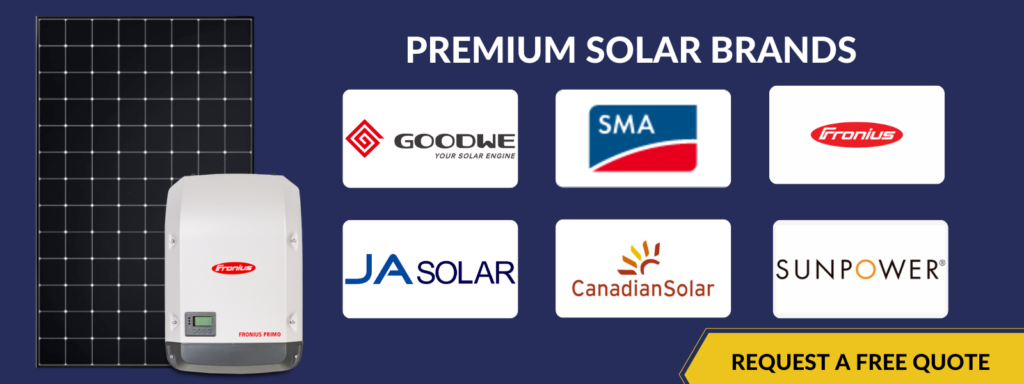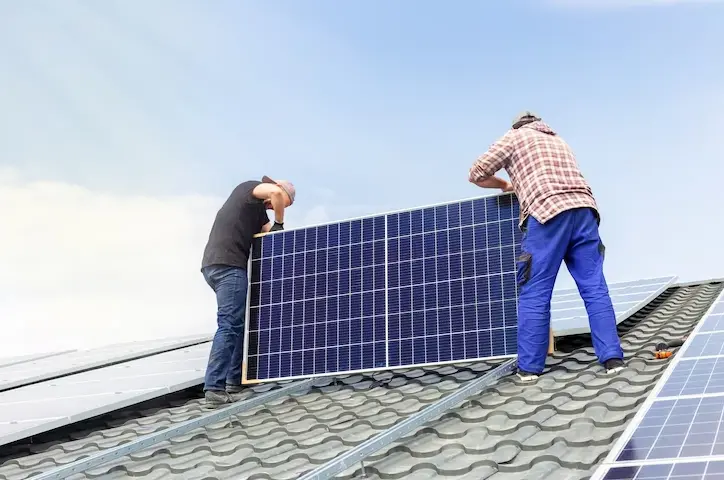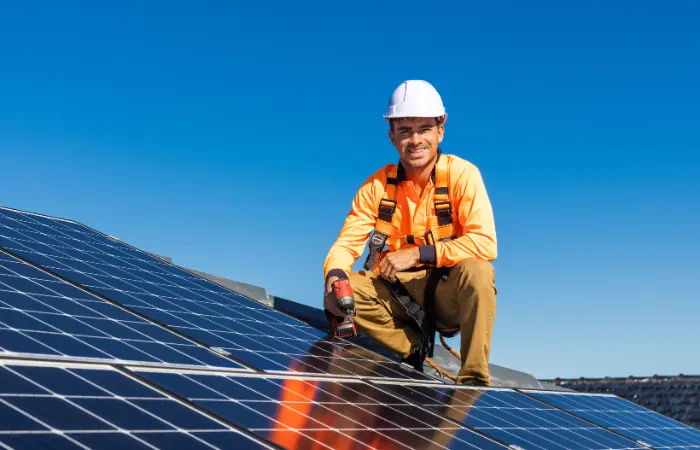Residential Solar Panels: Harnessing the Power of the Sun for Your Home
In the last few years, more people want solar panels for their homes because of the worldwide move towards eco-friendly energy. These systems use the sun’s energy and bring lots of advantages to homeowners, like lower electricity costs and helping the environment. Let’s take a closer look at residential solar panels, covering their benefits, how they’re installed, maintenance, costs, and more.
Meaning of Home Solar Panels
Home solar panels are installed on roofs to catch sunlight and turn it into electricity. These panels have solar cells that work together to create clean and sustainable power for homes.
Significance of Solar Power
Solar energy, the power behind home solar panels, is a renewable resource that greatly lessens dependence on fossil fuels. The sun’s abundance makes it a dependable and environmentally friendly solution for meeting our energy needs.
Increasing Adoption of Home Solar Panels
Due to technological progress and a growing awareness of the environment, home solar panels are now easier and cheaper to get. People around the world are choosing this eco-friendly energy option to efficiently power their homes.
Advantages of Residential Solar Panels
- Reduced Electricity Bills: A big reason people like home solar panels is they can cut down on electricity bills. When you produce your own power, you can greatly lessen or even get rid of your need for the regular electricity grid.
- Environmentally Friendly: Residential solar panels make clean energy without causing much harm to the environment, unlike traditional sources that release greenhouse gases. Using solar power helps in the worldwide fight against climate change.
- Energy Independence: Home solar panels let homeowners be more independent with their energy. Having a steady source of renewable energy helps households deal with changes in energy prices and shortages.
Types of Residential Solar Panels
- Monocrystalline: Monocrystalline solar panels are efficient because they’re made from a single crystal structure. This helps them turn sunlight into electricity with great precision.
- Polycrystalline: Polycrystalline solar panels are a more affordable option as they are made from multiple crystal structures. They have slightly lower efficiency compared to monocrystalline panels.
- Thin-Film: Thin-film solar panels are light and flexible, making them good for unconventional installations. Even though they’re not as efficient, they offer flexibility in design and use.

Installation Process
- Site Assessment: Before putting in the solar panels, a detailed check of the site is done to look at things like how much sunlight it gets, if there’s any shading, and the condition of the roof.
- System Design: Using the assessment results, a personalized solar panel system is planned to make the most energy for that particular spot.
- Permits and Approvals: Getting the required permits and approvals from local authorities is an important part of the installation process to make sure everything follows the rules.
- Installation Timeline: Putting in home solar panels usually takes a few days. Trained installers make sure it fits smoothly with your home’s structure.
Maintenance and Longevity
- Regular Cleaning and Inspections: To keep things working well, it’s important to clean and check the solar panels regularly. This means looking for dirt, debris, and any possible problems with the panels.
- Lifespan of Residential Solar Panels: Typically, home solar panels last for about 25 to 30 years. Doing regular maintenance and keeping an eye on them can make them last even longer.
- Warranty Considerations: It’s important for homeowners to know the details of the warranty to handle any unexpected problems that might come up while using the solar panels over time.

Financial Considerations
- Upfront Costs: Although buying home solar panels can cost a bit upfront, there are different ways to pay for them, like getting a loan or a lease. This makes it easier for homeowners to afford.
- Return on Investment: As time goes on, the money saved on electricity bills and the possibility of making some extra income by selling extra energy to the grid help make the investment in solar panels pay off well.
- Financing Options: To make switching to solar energy more affordable, homeowners can check out financing choices like solar loans, power purchase agreements (PPAs), or leasing arrangements.
Choosing the Right System for Your Home
- Energy Needs Assessment:Figuring out how much energy your home needs is important to decide the right size and power of the solar panel system you should get.
- Roof Suitability: Checking how your roof is doing and which way it faces is important to make sure it can handle solar panels and catch the most sunlight.
- Consulting with Professionals: Talking to experienced solar experts can give homeowners helpful advice and suggestions to make smart choices about their solar panel system.

Common Myths and Misconceptions
- High Upfront Costs: Despite what people might think, the decreasing costs of solar panel tech and available financial incentives make the initial expenses more doable for homeowners.
- Dependence on Weather Conditions: Although solar panels work best when it’s sunny, they can still make power on cloudy days, making sure you have a steady and reliable energy source.
- Complicated Maintenance: Taking care of home solar panels is easy and usually just means regular cleaning and occasional check-ups. This clears up the idea that it’s complicated to maintain them.
Real-Life Success Stories
- Testimonials from Homeowners: Listening to stories of homeowners who’ve gone for home solar panels and found success can motivate others to make the change and enjoy the advantages themselves.
- Impact on Communities: When a lot of people start using home solar panels, it helps the whole community be more sustainable, making a positive impact on the environment.

Future Trends in Residential Solar
- Technological Advancements: Continuous research and development are making improvements in solar technology, resulting in home solar panels that are more efficient and affordable.
- Integration with Smart Homes: More and more, people are connecting solar panels with smart home technology. This trend lets homeowners easily keep an eye on and make the most of their energy use.
- Increased Efficiency: We expect ongoing enhancements in the efficiency of solar panels, making home solar energy systems work even better..
Environmental Impact
- Reduction of Carbon Footprint: When homeowners use solar energy, they cut down a lot on their carbon footprint, helping the worldwide fight against climate change.
- Contribution to Sustainability Goals: A lot of people using home solar panels fits well with goals for sustainability, encouraging cleaner and greener ways of living.
Challenges and Solutions
- Aesthetics and Design Concerns: To deal with worries about how solar panels look on a home, there are new creative designs and integrated solutions coming up.
- Storage Solutions for Excess Energy: Researchers are actively working on a challenge: making energy storage solutions better so that home solar panel systems work even more effectively.

Comparison with Other Energy Sources
- Cost Comparison: When you look at how cost-effective home solar panels are compared to regular energy sources, it shows that solar energy has economic benefits in the long run.
- Environmental Impact: When you check how much solar energy affects the environment compared to other sources, it shows that solar power helps cut down on pollution and makes the planet cleaner.
Conclusion
- Recap of Key Benefits: Home solar panels provide homeowners with a sustainable, affordable, and eco-friendly way to meet their energy needs.
- Encouragement for Considering Residential Solar Panels: As technology gets better and more people know about it, choosing home solar panels is becoming a more attractive and doable option for homeowners who want a greener and more sustainable lifestyle.
Frequently Asked Questions
Residential solar panels typically have a lifespan of 25 to 30 years, with regular maintenance contributing to their longevity.
While solar panels perform optimally in sunny conditions, they can still generate power on cloudy days, ensuring a continuous energy supply.
Homeowners can explore options such as solar loans, power purchase agreements (PPAs), or leasing arrangements to make solar installations more financially feasible.
By harnessing clean and renewable energy, residential solar panels significantly reduce carbon footprints, aligning with global sustainability goals.
Call Us Anytime 1300 812 911,
WhatsApp : 0404718625


